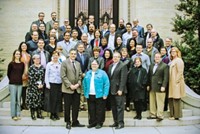Advertisement
Grab your lab coat. Let's get started
Welcome!
Welcome!
Create an account below to get 6 C&EN articles per month, receive newsletters and more - all free.
It seems this is your first time logging in online. Please enter the following information to continue.
As an ACS member you automatically get access to this site. All we need is few more details to create your reading experience.
Not you? Sign in with a different account.
Not you? Sign in with a different account.
ERROR 1
ERROR 1
ERROR 2
ERROR 2
ERROR 2
ERROR 2
ERROR 2
Password and Confirm password must match.
If you have an ACS member number, please enter it here so we can link this account to your membership. (optional)
ERROR 2
ACS values your privacy. By submitting your information, you are gaining access to C&EN and subscribing to our weekly newsletter. We use the information you provide to make your reading experience better, and we will never sell your data to third party members.
Careers
Hearing From Graduate Students
Higher Education: Essay contest engages students in efforts to improve graduate education
by Linda Wang
March 26, 2013
The National Science Foundation has found a unique way to solicit ideas from graduate students on how to improve graduate education.
The agency’s new “Innovation in Graduate Education Challenge” essay contest ensures that graduate students’ voices are part of the larger national dialogue about graduate education modernization, says James H. Lightbourne, director of the NSF Division of Graduate Education.
“Graduate students often have fresh, innovative ideas,” says Kate Stoll, an American Association for the Advancement of Science policy fellow at NSF, who came up with the idea for the challenge. “We want them to identify an issue in graduate education, propose their solution, and then we want them to justify how that solution would make an impact on graduate students and/or graduate education.”
Graduate students in science, technology, engineering, and mathematics (STEM) fields can submit their essay contest entries by April 15 at nsf.gov/news/special_reports/gradchallenge. Essays should be 1,000 to 1,500 words in length.
The first-place winner will receive $3,000. Two second-place winners will each receive $2,000, and three third-place winners will each receive $1,500. All winners will be announced on June 13.
NSF’s effort to improve STEM graduate education is part of a nationwide effort to reform graduate education. Last year, an American Chemical Society presidential commission issued the report, “Advancing Graduate Education in the Chemical Sciences,” which offers 32 recommendations. Suggestions include decoupling graduate student funding from professors’ research funding and balancing the number of new graduates with available employment opportunities.
Other groups that are also exploring STEM graduate education improvements include the National Institutes of Health’s Biomedical Research Workforce Working Group, the Council of Graduate Schools, and the National Academies Board on Higher Education & Workforce.
For more information about the NSF challenge, e-mail gradchallenge@nsf.gov.



Join the conversation
Contact the reporter
Submit a Letter to the Editor for publication
Engage with us on Twitter